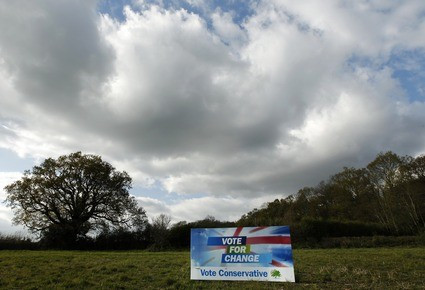Tories Facing Campaigning Crisis as Members Desert Cameron

While attention has been focused on Labour's row over its union mass membership figures, it has disguised a looming crisis for the Conservative party in the run-up to the 2015 election campaign.
Tory bosses claim they have some 174,000 individual members, a dramatic fall from the 250,000-plus who voted to elect David Cameron as leader in 2005. But even that may be an overestimate, concealing a freefall in party membership.
The influential Conservative Home website claims party insiders now admit the real figure is nearer 134,000, and there have been some reports it may be as low as 100,000.
The days of mass membership parties have long gone as voters have lost traditional tribal loyalties, become disillusioned with party politics and found other forms of engagement.
And the idea that the Tories could ever return to the three million mark achieved in the 1950s is unthinkable.
Finding realistic figures for Labour membership is complicated by the automatic affiliation of union members, but Ed Miliband has claimed he wants his reforms to see a boost in individual members to 500,000 compared to the 2011 level of around 193,000.
What Miliband recognises is that, despite the need to utilise modern communication techniques including social media, you just can't beat boots on the ground and people knocking on doors.
Digital turn
And this is a real danger for the Tories. If local constituency parties simply do not have the people to go out onto the streets knocking on doors, leafleting and canvassing in town centres they will have a serious problem maximising their vote.
Party Chairman Grant Shapps recognises the problem but has worried some grassroots members by suggesting the future lies in online and social media techniques.
"Mass communication may have taken a digital turn, but it's not the end for membership. In fact, quite the opposite," he told Conservative Home.
"All around us, new movements are bringing people together. The London Olympics Gamesmaker programme engaged thousands of volunteers from across the country using digital technology, and rewarding people for their dedication. This was a form of short-term membership.
"The 2012 Obama campaign reinvigorated supporters ahead of the Presidential re-election - creating a renewed zest for grassroots campaigning. These volunteers were effectively short-term members."
What Shapps wants is for people to join in rather than just join, at a cost of £25, he said.
"Support for our party now ranges all the way from a simple 'Like' on Facebook to becoming a Member of Parliament - and many different forms along the way.
"This all amounts to hundreds of thousands of people who now keep up-to-date with Conservative ideas and campaigns that they care about each week."
The danger with this remote campaigning, however, is just that. It is remote from individual people, often does not allow for persuasion and can lead to only short-term interest.
One former senior party aide told IBTimes UK: "New media techniques are all well and good but you simply cannot beat having people going door-to-door encouraging people to go out and vote and arguing through policies with them.
"The danger is we start acting like a pressure group and don't draw people in for the long-term."
And the fear is that such remote techniques such as cold calling, mass tweeting and so on only succeed in disengaging people even more from active, party-based politics.
And that may end up as being a bigger threat, not just to the Conservative party but to the entire parliamentary process.
© Copyright IBTimes 2025. All rights reserved.






















